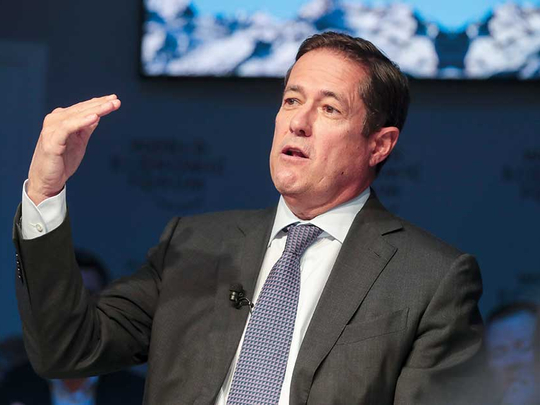
Davos
Global finance executives warned of parallels between today’s soaring stock markets and the froth of the pre-crisis years as they said investors could be wrong-footed by central banks raising interest rates.
As the World Economic Forum’s annual meeting got underway in Davos, Switzerland, the leaders of Barclays Plc, Citigroup Inc. and the Carlyle Group all fretted that the strongest global economy since 2011 was leaving financial markets complacent. Equities worldwide are already up more than $3 trillion this year.
“There is a numbness out there, there is an ambivalence out there that’s concerning,” Citigroup Chief Executive Officer Michael Corbat said on a Davos panel hosted by Bloomberg’s Tom Keene. “When the next turn comes — and it will come — it’s likely to be more violent than it would otherwise be if we let some pressure off along the way.”
- Jes Staley | CEO of Barclays
Jes Staley, the CEO of Barclays, said the upbeat environment reminded him of the eve of the last crisis a decade ago and that the combination of stocks at record highs and volatility near all-time lows wasn’t “sustainable” in the long term. He too said trouble could occur if central banks such as the US Federal Reserve push up borrowing costs faster than investors anticipate.
Corbat and Staley said financial-services companies had learnt from the last crisis and were now more resilient and less complex. Still, they warned bankers to stay alert.
Depression-era policy
“I do feel it’s a little bit like 2006, when we were all talking whether we’ve solved the riddle of economic crises,” said Staley. “We’ve got a monetary policy that’s still in the remnants of the depression era. We’ve got very little capacity in the capital markets to deal with a real move in interest rates.”
Anne Richards, chief executive of M&G Investments, also saw reason for concern. “If interest rates go up meaningfully over the next 12 months, there will be a bunch of people who have borrowed money who will not be able to pay it back,” she said. “Those people are out there, and the markets are not, in aggregate, pricing that.”
Harvard University professor Kenneth Rogoff, who co-wrote the definitive history of the financial crisis, said there was already the potential for a rebound in inflation-adjusted interest rates given US inflation will likely grow by 2 per cent or more this year.
“If interest rates go up even modestly, halfway to their normal level, you will see a collapse in the stock market,” he said. “I don’t know how everything from art and Bitcoin to stock prices will react as interest rates go up.”
Higher rates will also affect the $5 trillion burden of dollar-denominated debt held by emerging-market companies., the panellists said. Among other risks, they cited mounting government debt in China and elsewhere, rising protectionism, and the potential for geopolitical shocks.
“The biggest concern I have is that most people think there’s no problem of a likely recession this year or early next year,” said Carlyle’s David Rubenstein, who cofounded the private-equity firm more than 30 years ago. “Generally, when people are happy and confident, something wrong happens.”












